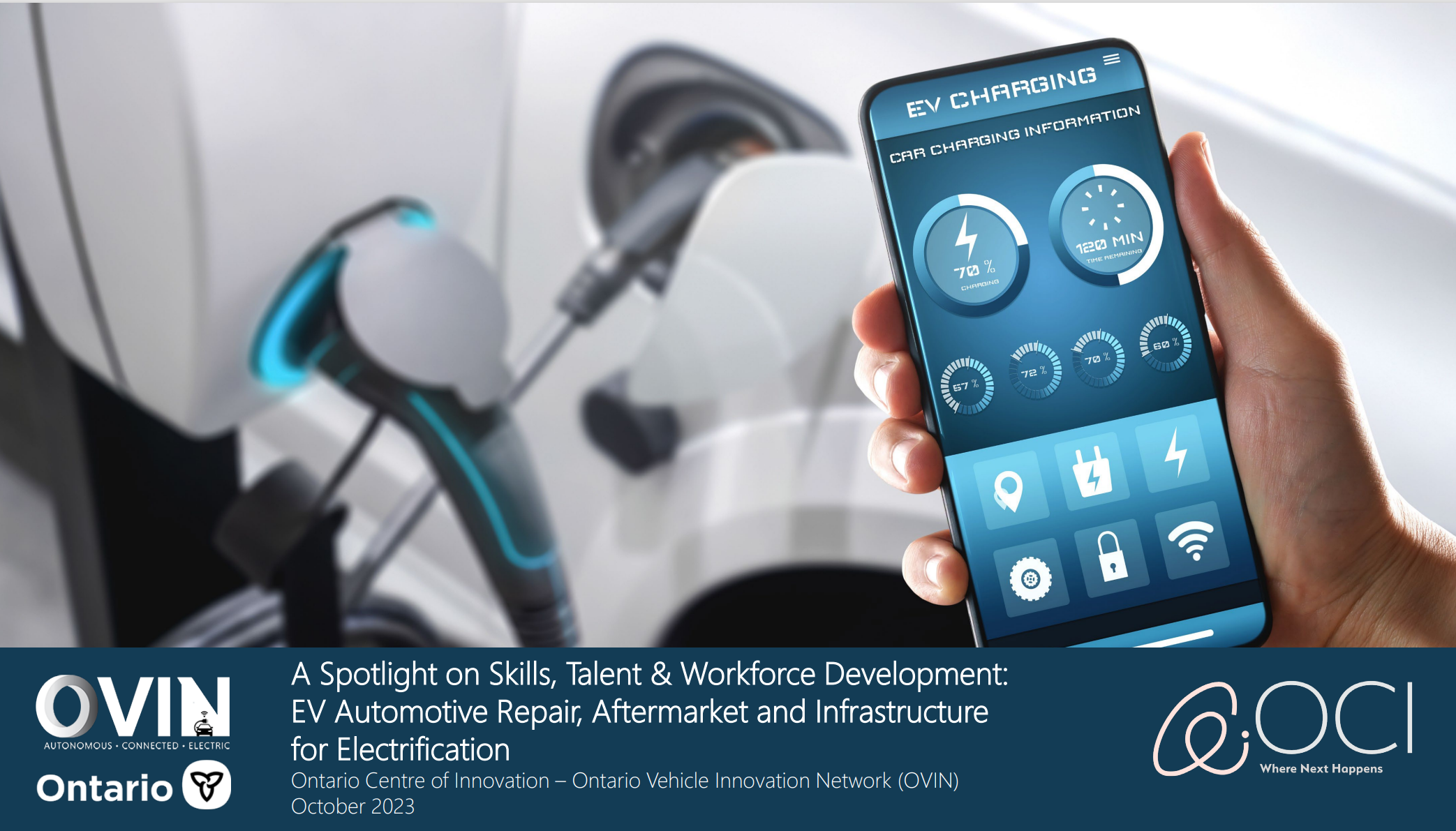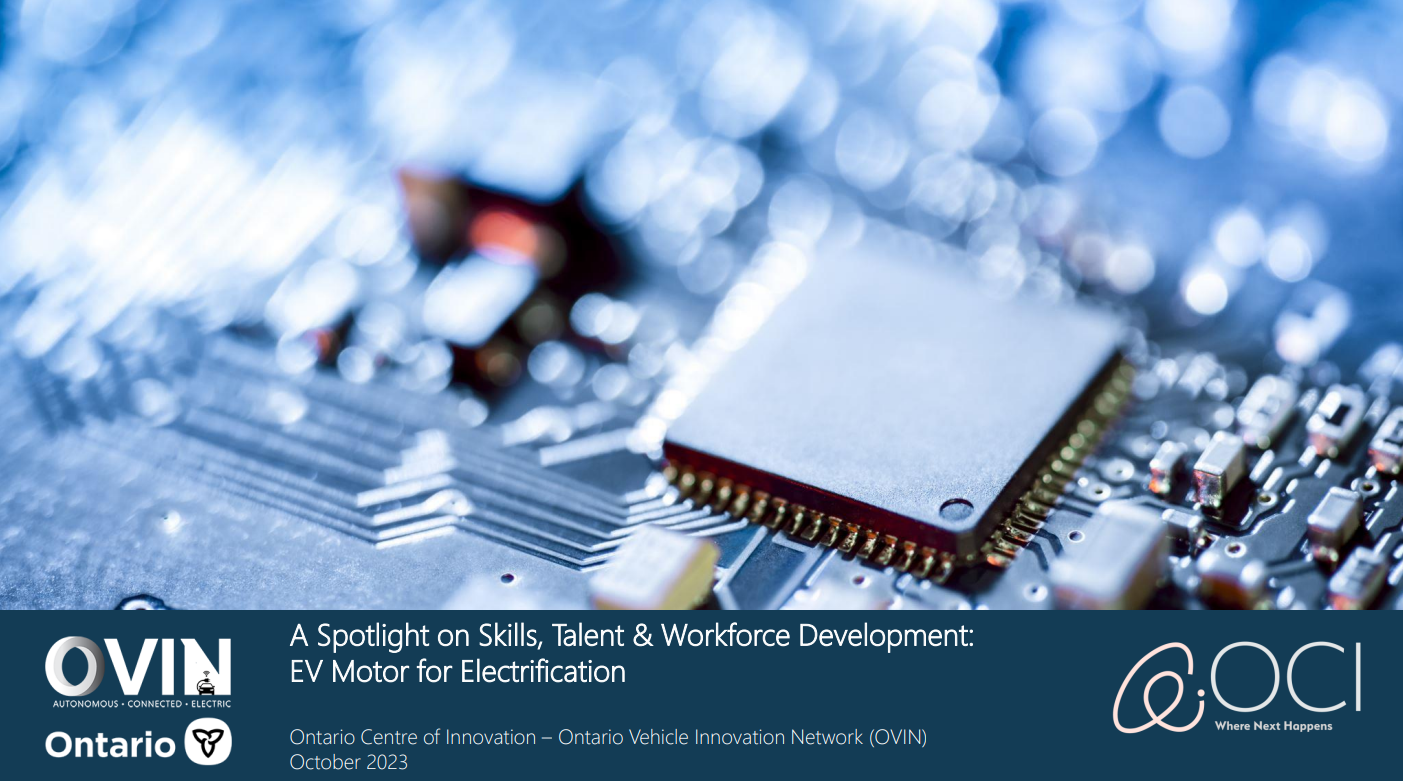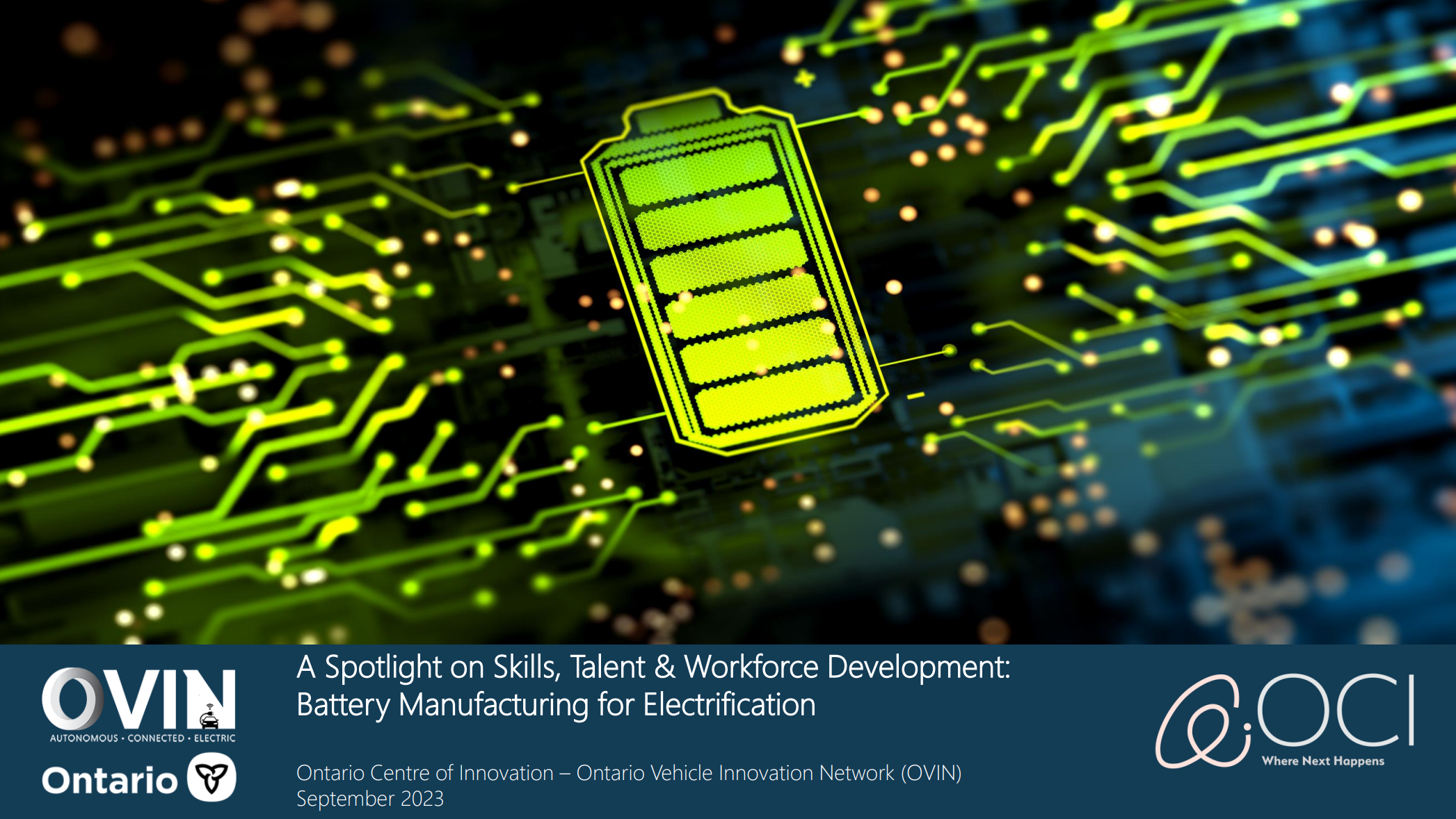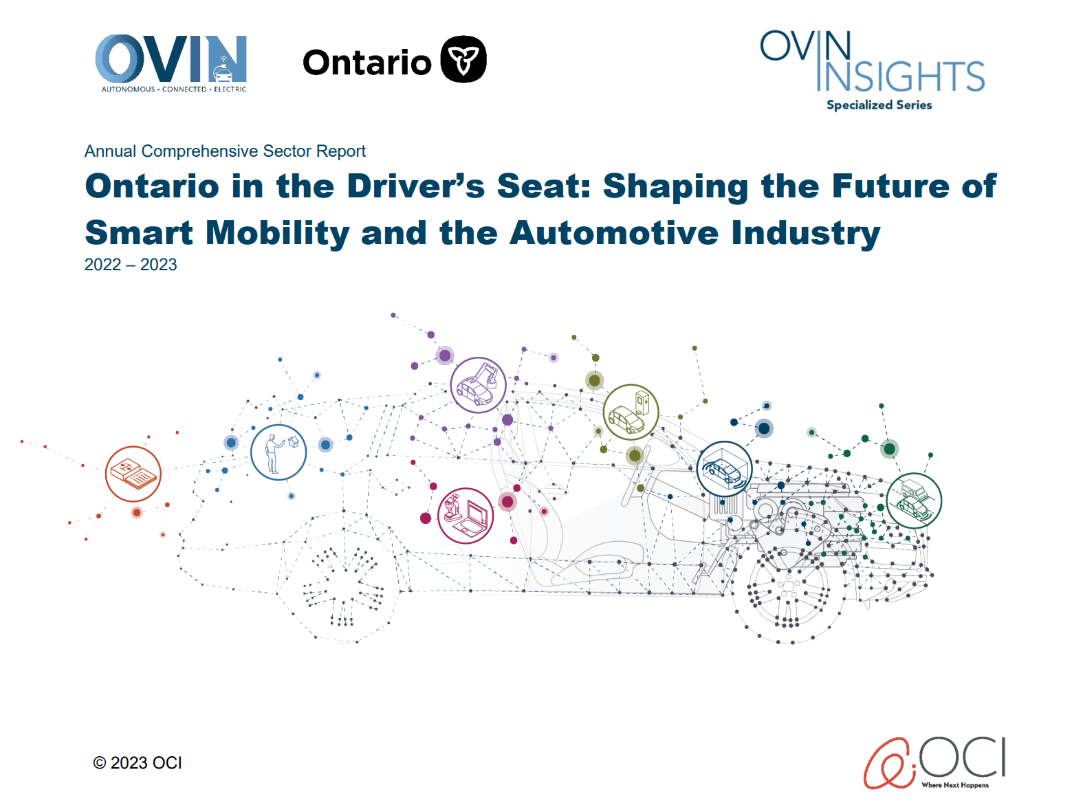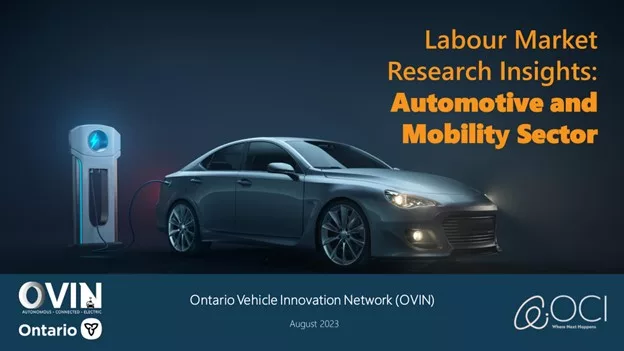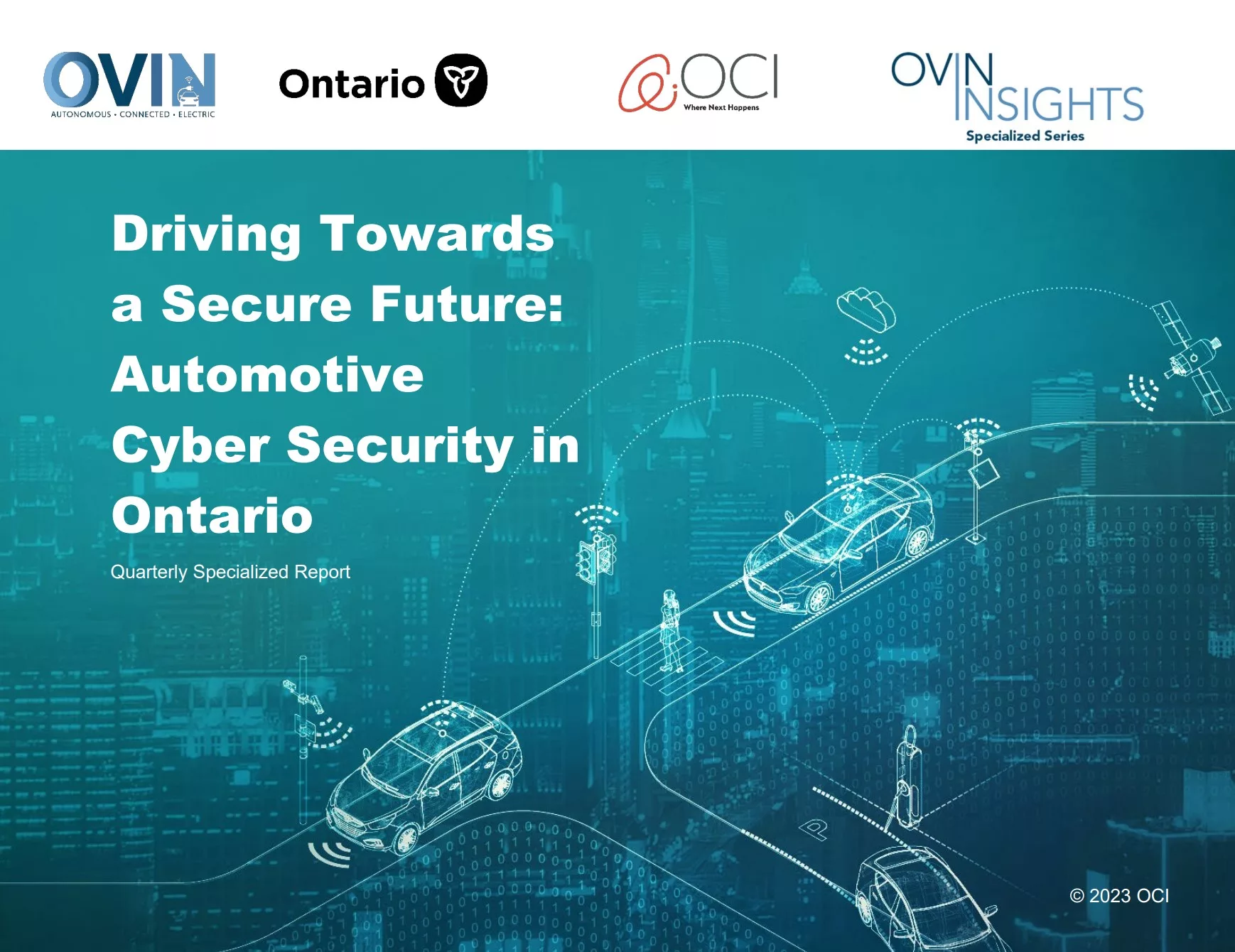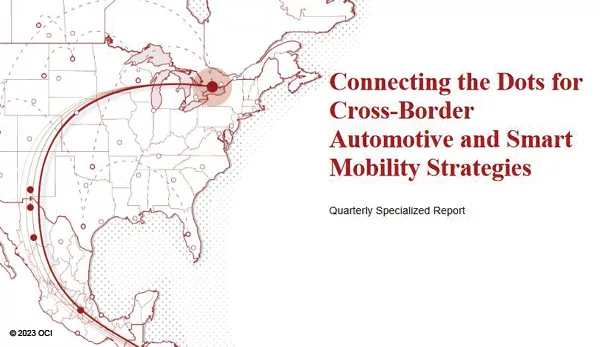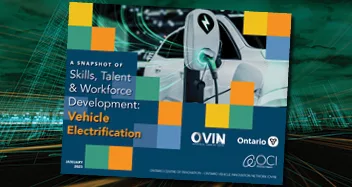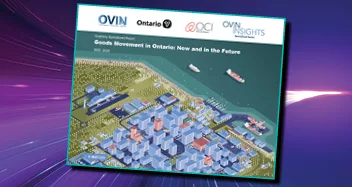Reports
Get in-depth insights into the automotive and mobility sectors with OVIN’s reports.

OVIN Reports
-

Leading the Charge: Ontario’s Leadership in EV Charging Innovation
The electric vehicle (EV) charging industry has expanded rapidly in recent years, along with global ambitions to decarbonize the transport sector. EV chargers are essential to the development of the EV market – without sufficient charging infrastructure, the electrification of transport would not be able to keep pace with demand. This global expansion is pushing technological innovations, with EV charging organizations exploring opportunities for faster charging, wireless charging, and smart charging, and looking at how charging solutions can unlock opportunities for the sector.
-

Ontario’s Unique Position: Hardware Electronics and Semiconductors and Their Role in the Automotive and Mobility Sector
Ontario is uniquely positioned to be a central player in the semiconductor supply chain. The province is home to sought-after technical expertise and key industrial dependencies in automotive and advanced manufacturing. Ontario can play a leading role in the semiconductor space through its robust automotive sector, providing the link between chip manufacturing, EVs, and advanced automotive and mobility technologies.
-

A Spotlight on Skills, Talent & Workforce Development: EV Automotive Repair, Aftermarket and Infrastructure for Electrification
EV infrastructure, aftermarket and repair are the fourth and fifth stages of the automotive Electrification value chain and include the installation and maintenance of specialized infrastructure geared towards EVs, including grid planning/assessment, charging stations as well as servicing for EVs after they have been sold to the final user.
-

A Spotlight on Skills, Talent & Workforce Development: EV Motor for Electrification
As a result of sectoral transformations, various skills and occupations are emerging in the EV motor sector, particularly in areas related to motor design and production, including expertise in design and electrical engineering. The increasing demand for technical skills and abilities in the sector highlights major trends in automation and digitalization within the sector.
-

A Spotlight on Skills, Talent & Workforce Development: Battery Manufacturing for Electrification
Battery Manufacturing is the second stage of the automotive Electrification value chain, and in includes various stages of production, notably, battery cell components, battery cells, battery modules, pack assembly, and battery management systems. This report provides an overview of Ontario’s advancements, occupations and representation of minority groups in the sector.
-

Ontario in the Driver’s Seat: Shaping the Future of Smart Mobility and the Automotive Industry
As the driving force of Canada’s automotive sector, Ontario has been pioneering technology breakthroughs in connected, autonomous, and electric mobility. Home to world-class research institutions, manufacturing facilities, mining companies, technology development sites, and financial services, Ontario fosters a culture of innovation that encourages and enables the commercialization of new technologies and services
-

A Spotlight on Skills, Talent & Workforce Development: Critical Minerals for Electrification
The Province of Ontario is rich in a variety of critical minerals, including copper, cobalt, and nickel, which play a key role in the production and development of advanced technologies, such as electric vehicles (EVs). As of 2022, Ontario has 37 active mining operations, with 10 of them producing critical minerals. The critical mineral industry generates over $3.5 billion in annual mineral production for the province, showcasing its importance and potential for Ontario’s economy.
-

Labour Market Research Insights: Automotive and Mobility Sector
In recent years, the emergence of new technologies in the automotive and mobility sector impacted skills and training that workers require to be successful in the field. Here is a breakdown of major trends in electrification, automation, and digital transformation that are driving training, education, and skills requirements for workers in the sector. These trends and technological advancements have raised upskilling and talent development needs for individuals seeking employment in the sector. In particular, job seekers m ay need to gather an increasingly technical and specialized skillset to fulfill employers’ needs.
-

Driving Towards a Secure Future: Automotive Cyber Security in Ontario
Cyber attacks are becoming increasingly pervasive as everyday processes and products are digitalized. In the automotive industry, cyber security is gaining increased focus as vehicles—which can now feature more lines of code than a 747 jet—become increasingly complex and digital. Organizations across Ontario are playing a leading role in the development of cyber security solutions. Ongoing projects at world-class automotive cyber security research labs and partnerships between the private sector and academia are facilitating Ontario-made cyber security innovations. With these strengths and its thriving automotive sector, Ontario is uniquely positioned to continue pioneering advances in automotive cyber security. Read the Executive Summary or download the full report.
-

Connecting the Dots for Cross-Border Automotive and Smart Mobility Strategies
The cross-border movement of people and goods is a key driver of economic growth. Canada’s ports of entry play a major role in cross-border movement, facilitating both international trade and tourism. As trends towards globalization continue and advances in transportation encourage movement, effective cross-border processes and infrastructure will be increasingly important for ensuring the safe and efficient movement of people and goods. Read the Executive Summary or download the full report.
-

A Snapshot of Skills, Talent & Workforce Development: Vehicle Electrification
As the automotive and parts manufacturing industry transitions to the low-carbon economy and embraces advanced digital and automation technologies, a workforce with a broader mix of skills, training and experience will be required. Some of these emerging skills in the electrification value chain include digital skills, knowledge of advanced manufacturing, software development for vehicle electronics, and battery design. Additionally, skills related to battery and charging technologies, along with EV and infrastructure maintenance, and repair skills are expected to be high in demand. In addition to this technical knowledge, non-technical skills and abilities, such as communication skills, leadership, motivation, a learning mindset, and problem-solving skills will all be differentiating factors for the labour pool.
-

Goods Movement in Ontario: Now and in the Future
This report presents an overview of Ontario’s goods movement industry with a focus on road transportation. It examines the current state of some of the key elements of the goods movement sector, including policies, infrastructure investments, and pilot programs. The report concludes by identifying some opportunities to build upon Ontario’s successes in road transportation. Read the Executive Summary or download the full report.
External Reports
-

The Impact of COVID-19 on Future Mobility Solutions
As the global pandemic spreads, mobility players need to prepare for the new world ahead.
-
Canada’s automotive future: Next-generation vehicles will change the industry as we know it
The global auto industry is heading toward a transformation – and the wide-ranging changes are well underway. In the next five years, production of electrically powered vehicles by all major original equipment manufacturers (OEMs) will rapidly accelerate, as well the advancement of autonomous features.
-
Industry 4.0 in automotive: Digitizing the end-to-end automotive value chain.
To encourage consumer update of advanced vehicle technologies, the automotive ecosystem still has some work to do, including figuring out just who will build and pay fro electric vehicle charging infrastructure.
-
Location, location, location in a mobile future.
The new mobility ecosystem involves transporting people and food from point A to point B in different ways. And that means profound impacts on the uses – and value – of real estate: points A, B, and everything in between.
-
The case for an end-to-end automotive-software platform
Software is transforming car capabilities but also creating development challenges for automotive players. An end-to-end approach that integrates independent software elements into a comprehensive platform can improve functionality and decrease complexity.
-
The Future of the Last-Mile Ecosystem
The aim of our advanced analytics-based congestion simulation and quantitative modelling is to inform last-mile ecosystem players’ strategy discussions through a solid fact base, to encourage public-private partnerships and to accelerate the development and implementation of effective interventions.
-
Testing is Critical for Adoption of Autonomous Vehicles
The autonomous vehicle combines various connected car technologies such as sensors, computers, and software which need rigorous testing to ensure conformance to safety and performance standards.
-
The Future of Mobility is at our Doorstep
What mattered in the automotive and mobility markets in 2019, and what will dominate the space in 2020? We look closer at the autonomous, connected, electrified, and shared trends that matter.
-
Activating a Seamless Integrated Mobility System (SIMSystem): Insights into Leading Global Practices
The World Economic Forum and Deloitte Consulting set out to define how such a seamless integrated mobility system might function and help address pressing mobility challenges.
-
2020 Global Automotive Consumer Study
The Global Automotive Consumer Study helps inform Deloitte’s work and insights into the evolution of mobility, smart cities, connectivity, transportation, and other changes transforming the movement of people and goods.
-
Ensuring American Leadership in Automated Vehicle Technologies.
This report presents a unifying posture to inform collaborative efforts in automated vehicles for all stakeholders and outlines past and current Federal Government efforts to address these areas of concern.
-
Constructing a Connected Car Ecosystem
The automotive industry is preparing for a future defined by connected, autonomous, shared, and electric (CASE) technology. To reach that future, automakers are beginning the process of bottom-up reorganization known as digital transformation.


